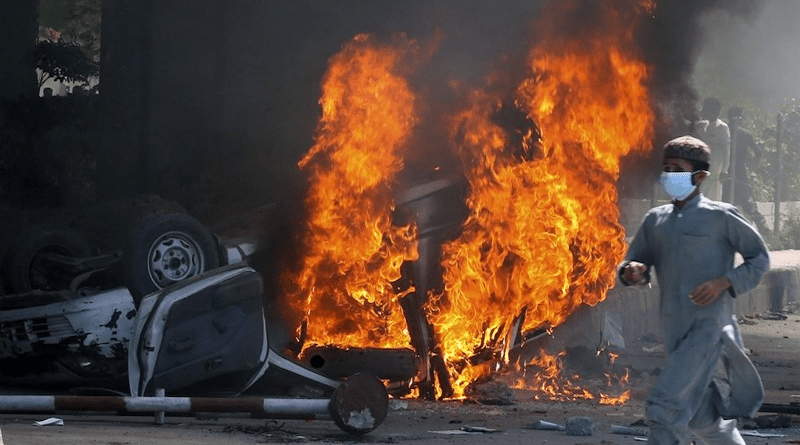Building Consensus For A Prosperous Pakistan: Confronting Violence In Protests – OpEd
The recent protests in Pakistan raised questions about stability and peace. This protest did not spare civil property as well as its national heroes. Jinnah House, Lahore, the statue of Colonel Sher Khan Shaheed, who fought till the last drop of blood in Kargil, did not leave it. Radio Pakistan Peshawar also became a hot spot during the protest.
It is known to everybody that the army institution is loyal to the state and has no direct commitments with the government;instead, the institution has the right to assist and cooperate with the government in its affairs but has to ensure the safety of a country, keeping in view the traditional and non-traditional threats. Despite the ignorant attitude of the protestors, the armed forces showed a level of patience that increased their respect and institutional dignity.
No political party has the right to violate the sanctity of Pakistan’s forces. The army, which is suffering from the fifth-generation war, and the nation of Pakistan should not forget that this army has made countless sacrifices in the war against terrorism and is protecting the country from every front. The army should not be blamed for the incompetence of political leadership.
Recently, Imran Khan was arrested in the Al-Qadir trust case. Imran Khan is facing corruption allegations in the Al-Qadar Trust. Last year, Khan and his wife were accused of buying land from Pakistani property billionaire Malik Riaz for billions of rupees for their trust to build a university. Pakistan’s National Accountability Bureau (NAB) asserts that the trust laundered $239 million at the government’s cost to shield Riaz from punishment.
In December 2019, Riaz sent the UK National Crime Agency $239 million properties to investigate “black money.” These funds may relate to the Al-Qadir University Trust inquiry. Pakistan’s media has covered the issue extensively as a political issue. Khan denies guilt and claims the case is political. The case’s outcome may impact Pakistani politics and the Al-Qadir University Trust.As a result of Imran Khan’s arrest on May 9, 2023, violent protests were called out in the country, in which metro bus stations, civilian vehicles, and even the memorial of some martyrs deserted in Sargodha, which has received Nishan Haider. This proves that PTI followers are devoid of political consciousness, have become fan clubs, and are self-obsessed in their decisions.
In a democratic country, peaceful protest is the right of every citizen. However, in cases of violence, the security forces have the right to defend public property and themselves. The violent culture should be condemned at every level, as Pakistan has suffered dramatically since independence. In the contemporary situation, all the political and military leadership must build consensus on one agenda: a prosperous Pakistan.
It is a harsh reality that Pakistan is on the brink of default, our economic situation is on the verge of chaos, and our fiscal status is entirely at the mercy of the Inter-Monitory Fund (IMF). Due to the fragile economic and political situation, there is an upsurge in terrorism, unemployment, crime, and a lack of investors in the country.
In the prevailing situation, the judiciary has a crucial role in bringing all the political leadership to one point: ensuring general elections under the light of the constitution. Despite it, the country will bear enormous consequences if a political consensus is not built, then the country will bear a severe consequences.
Since 1947, the Pakistani army has faced dynamic challenges; just after a year of independence, the army was inculcated in the Kashmir war. After almost two decades, India barely violated its territorial integrity in 1965 and declared war on Pakistan. After six years, Pakistan faced a considerable loss in the form of the fall of Dhaka. Moreover, the Kargil War and the War on Terror are recent examples that speak loudly about the sacrifices made by the Armed Forces.
Even though each institution in Pakistan’s political system—the judiciary, civil society, political parties, andthe judiciary has been criticized for managing high-profile cases and lacking independence. Civil society organizations have increased their appeals for greater transparency and accountability, but government regulations have hampered their efforts. Political parties’ internal corruption and lack of public accountability have long been issues.
These establishments’ long-term outlook is met with both optimism and skepticism. Optimistic assumptions are based on the expansion of independent media and the participation of civil society organizations, both of which point to the possibility of increased transparency and accountability. In its 2020 assessment, the World Justice Project ranked Pakistan 120th out of 128 countries for judicial independence. However, it’s important to acknowledge the sensitivity of Pakistan’s situation the people should not lose the patience and the politicians should not blackmail each other instead of building a consensus
Abdul Mussawer Safi has written for sites like International Policy Digest, Modern Diplomacy, the South Asia Journal, Eurasia Review, and Kashmir Watch. He is getting his bachelor’s in international relations at the National Defense University in Islamabad. He is very interested in world politics, especially the way South Asia works as an area. His skills are critical analysis and SWOT analysis. He tweets at @MussawerSafi and can be reached at [email protected]

